女性形象
女性形象分析及教学实践(3篇)
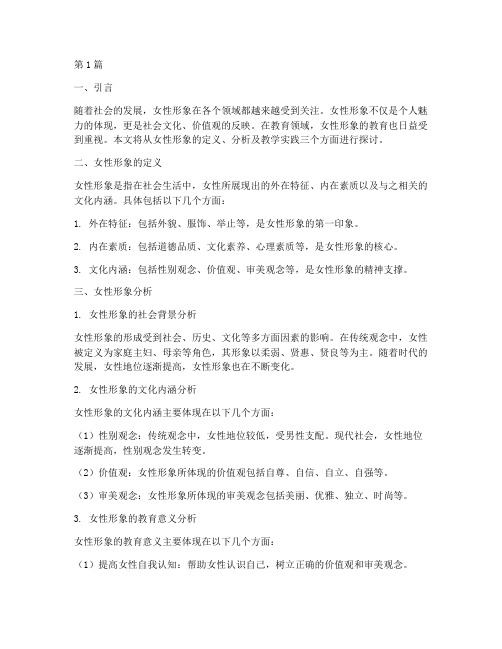
第1篇一、引言随着社会的发展,女性形象在各个领域都越来越受到关注。
女性形象不仅是个人魅力的体现,更是社会文化、价值观的反映。
在教育领域,女性形象的教育也日益受到重视。
本文将从女性形象的定义、分析及教学实践三个方面进行探讨。
二、女性形象的定义女性形象是指在社会生活中,女性所展现出的外在特征、内在素质以及与之相关的文化内涵。
具体包括以下几个方面:1. 外在特征:包括外貌、服饰、举止等,是女性形象的第一印象。
2. 内在素质:包括道德品质、文化素养、心理素质等,是女性形象的核心。
3. 文化内涵:包括性别观念、价值观、审美观念等,是女性形象的精神支撑。
三、女性形象分析1. 女性形象的社会背景分析女性形象的形成受到社会、历史、文化等多方面因素的影响。
在传统观念中,女性被定义为家庭主妇、母亲等角色,其形象以柔弱、贤惠、贤良等为主。
随着时代的发展,女性地位逐渐提高,女性形象也在不断变化。
2. 女性形象的文化内涵分析女性形象的文化内涵主要体现在以下几个方面:(1)性别观念:传统观念中,女性地位较低,受男性支配。
现代社会,女性地位逐渐提高,性别观念发生转变。
(2)价值观:女性形象所体现的价值观包括自尊、自信、自立、自强等。
(3)审美观念:女性形象所体现的审美观念包括美丽、优雅、独立、时尚等。
3. 女性形象的教育意义分析女性形象的教育意义主要体现在以下几个方面:(1)提高女性自我认知:帮助女性认识自己,树立正确的价值观和审美观念。
(2)促进性别平等:通过教育,消除性别歧视,促进男女平等。
(3)培养女性综合素质:提高女性道德品质、文化素养、心理素质等。
四、女性形象教学实践1. 教学目标(1)帮助学生树立正确的女性形象观念。
(2)提高学生的审美能力。
(3)培养学生的道德品质、文化素养、心理素质等。
2. 教学内容(1)女性形象的历史演变:介绍女性形象在不同历史时期的特点和变化。
(2)女性形象的现状分析:分析当前社会女性形象的特点和问题。
中国古代文学中的女性形象
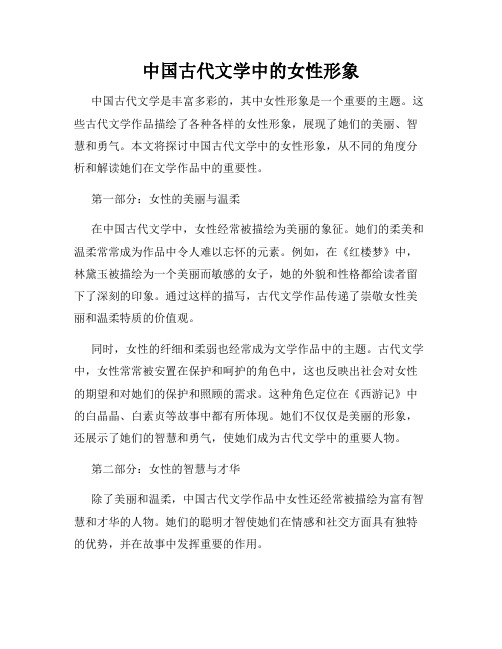
中国古代文学中的女性形象中国古代文学是丰富多彩的,其中女性形象是一个重要的主题。
这些古代文学作品描绘了各种各样的女性形象,展现了她们的美丽、智慧和勇气。
本文将探讨中国古代文学中的女性形象,从不同的角度分析和解读她们在文学作品中的重要性。
第一部分:女性的美丽与温柔在中国古代文学中,女性经常被描绘为美丽的象征。
她们的柔美和温柔常常成为作品中令人难以忘怀的元素。
例如,在《红楼梦》中,林黛玉被描绘为一个美丽而敏感的女子,她的外貌和性格都给读者留下了深刻的印象。
通过这样的描写,古代文学作品传递了崇敬女性美丽和温柔特质的价值观。
同时,女性的纤细和柔弱也经常成为文学作品中的主题。
古代文学中,女性常常被安置在保护和呵护的角色中,这也反映出社会对女性的期望和对她们的保护和照顾的需求。
这种角色定位在《西游记》中的白晶晶、白素贞等故事中都有所体现。
她们不仅仅是美丽的形象,还展示了她们的智慧和勇气,使她们成为古代文学中的重要人物。
第二部分:女性的智慧与才华除了美丽和温柔,中国古代文学作品中女性还经常被描绘为富有智慧和才华的人物。
她们的聪明才智使她们在情感和社交方面具有独特的优势,并在故事中发挥重要的作用。
许多古代文学作品中的女性形象都具备出色的才艺和学识。
例如,在《红楼梦》中,史湘云被描绘为一个机智聪明的女性,她的才华和智慧使她成为故事中最受欢迎和令人钦佩的人物之一。
同样,在《儿女英雄传》中的文秀也是一个聪明而有才华的女性,她的才艺使她能够在男性主导的社会中脱颖而出。
古代文学中的女性形象还展示了她们在政治和决策上的能力。
例如,在《史记》中,武则天作为唐朝的皇帝,她的智慧和才能使她成为中国历史上唯一的女性皇帝。
她在政治和统治方面的才智使她在当时的社会中取得了巨大的成功。
第三部分:女性的勇气与坚韧除了美丽和智慧,中国古代文学中的女性形象还经常被描绘为勇敢和坚韧的人物。
她们在面对困难和挑战时展现出了非凡的勇气和韧性。
许多古代文学作品中的女性形象都具备决心和勇气。
中国古代文学中的女性形象
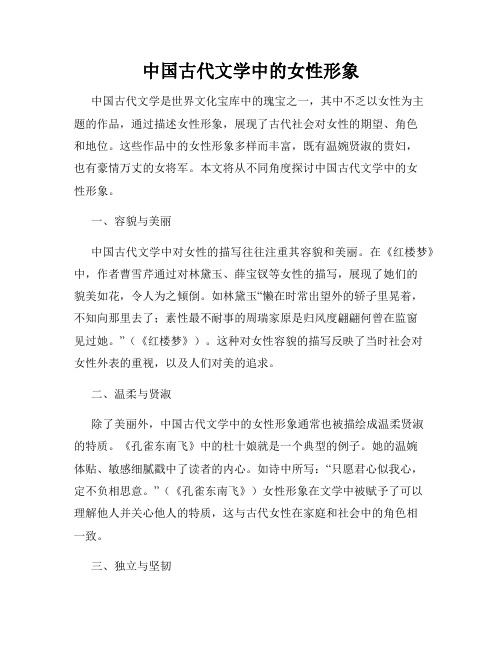
中国古代文学中的女性形象中国古代文学是世界文化宝库中的瑰宝之一,其中不乏以女性为主题的作品,通过描述女性形象,展现了古代社会对女性的期望、角色和地位。
这些作品中的女性形象多样而丰富,既有温婉贤淑的贵妇,也有豪情万丈的女将军。
本文将从不同角度探讨中国古代文学中的女性形象。
一、容貌与美丽中国古代文学中对女性的描写往往注重其容貌和美丽。
在《红楼梦》中,作者曹雪芹通过对林黛玉、薛宝钗等女性的描写,展现了她们的貌美如花,令人为之倾倒。
如林黛玉“懒在时常出望外的轿子里晃着,不知向那里去了;素性最不耐事的周瑞家原是归风度翩翩何曾在监窗见过她。
”(《红楼梦》)。
这种对女性容貌的描写反映了当时社会对女性外表的重视,以及人们对美的追求。
二、温柔与贤淑除了美丽外,中国古代文学中的女性形象通常也被描绘成温柔贤淑的特质。
《孔雀东南飞》中的杜十娘就是一个典型的例子。
她的温婉体贴、敏感细腻戳中了读者的内心。
如诗中所写:“只愿君心似我心,定不负相思意。
”(《孔雀东南飞》)女性形象在文学中被赋予了可以理解他人并关心他人的特质,这与古代女性在家庭和社会中的角色相一致。
三、独立与坚韧然而,在古代文学中,女性形象并非仅限于依附于男性的角色。
一些女性形象展现出独立与坚韧的品质。
如《西游记》中的女儿村,她们一直坚守着对男儿的期盼。
在《红楼梦》中,甄嬛则通过智慧和勇气,充分展现出她的独立精神。
这些形象传递了女性在古代社会中也有自己的追求和价值。
四、才华与格调中国古代文学中也描绘了许多才华出众的女性形象,她们以自己的才华和格调独树一帜。
在唐代的女诗人们中,如李清照和薛涛,她们的才华被广泛称赞。
她们通过优美的诗歌表达了自己的情感和见解,同时也为后世的女性树立了榜样。
五、对抗与解放中国古代文学中也涌现了一些女性形象,她们勇敢地对抗压迫和不公平,追求自己的解放。
《水浒传》中的林冲妻子潘金莲就是这样一个形象,她通过智慧和勇气解放了自己。
这些形象在古代文学中代表了女性力量的觉醒与抗争。
中国古代历史与文化中的女性形象
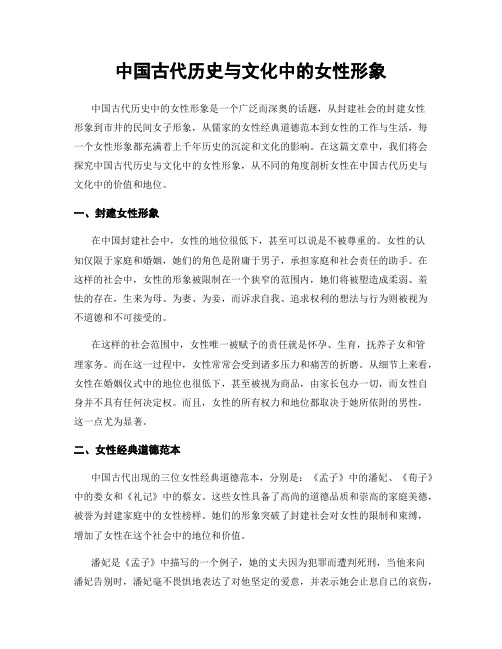
中国古代历史与文化中的女性形象中国古代历史中的女性形象是一个广泛而深奥的话题,从封建社会的封建女性形象到市井的民间女子形象,从儒家的女性经典道德范本到女性的工作与生活,每一个女性形象都充满着上千年历史的沉淀和文化的影响。
在这篇文章中,我们将会探究中国古代历史与文化中的女性形象,从不同的角度剖析女性在中国古代历史与文化中的价值和地位。
一、封建女性形象在中国封建社会中,女性的地位很低下,甚至可以说是不被尊重的。
女性的认知仅限于家庭和婚姻,她们的角色是附庸于男子,承担家庭和社会责任的助手。
在这样的社会中,女性的形象被限制在一个狭窄的范围内,她们将被塑造成柔弱、羞怯的存在,生来为母、为妻、为妾,而诉求自我、追求权利的想法与行为则被视为不道德和不可接受的。
在这样的社会范围中,女性唯一被赋予的责任就是怀孕、生育,抚养子女和管理家务。
而在这一过程中,女性常常会受到诸多压力和痛苦的折磨。
从细节上来看,女性在婚姻仪式中的地位也很低下,甚至被视为商品,由家长包办一切,而女性自身并不具有任何决定权。
而且,女性的所有权力和地位都取决于她所依附的男性,这一点尤为显著。
二、女性经典道德范本中国古代出现的三位女性经典道德范本,分别是:《孟子》中的潘妃、《荀子》中的娄女和《礼记》中的蔡女。
这些女性具备了高尚的道德品质和崇高的家庭美德,被誉为封建家庭中的女性榜样。
她们的形象突破了封建社会对女性的限制和束缚,增加了女性在这个社会中的地位和价值。
潘妃是《孟子》中描写的一个例子,她的丈夫因为犯罪而遭判死刑,当他来向潘妃告别时,潘妃毫不畏惧地表达了对他坚定的爱意,并表示她会止息自己的哀伤,照顾好他的父母和家庭。
她的行为和态度坚定而勇敢,充分体现了她的高贵品质和崇高的家庭美德。
娄女在《荀子》中的形象是更加凸显妇德的一个例子。
她嫁了一个丈夫,丈夫在战场上失落,为了不让孤独和孔惑儿女,她减少了自己的年节,换来了一个好的家庭环境。
她的妇德表现在:品德的高尚、对家庭的忠诚、主人公加的谦让。
女性形象资料

女性形象
在文学作品和艺术作品中,女性形象一直被赋予了丰富的内涵和意义。
女性形
象既可以是柔弱的花朵,也可以是坚强的战士;既可以是温柔的母亲,也可以是独立的职业女性。
女性形象的多样性展现了女性的复杂性和多面性,也反映了社会对女性的不同期待和对女性角色的多重定义。
在古代文学作品中,女性形象往往被塑造成贤淑的贤妻良母。
比如《红楼梦》
中的林黛玉,她虽然柔弱敏感,但内心却有着坚定的信念和不屈的意志。
她对爱情的坚守和对家族的责任感成为了她形象的一部分,也成为了读者心中永远的经典形象。
而在现代文学和电影作品中,女性形象更加多元化和立体化。
从《傲慢与偏见》中的伊丽莎白·班内特到《饮食男女》中的周芳,女性形象不再局限在传统的角色
定位上,而是展现出更加个性化和独立思考的特质。
她们有自己的事业和梦想,有自己的烦恼和挫折,展现了现代女性的励志和拼搏精神。
同时,女性形象也常常被用来反映社会的问题和思考。
比如在《小王子》中的
那朵被玫瑰花表示的玫瑰女人,反映了女性在爱情中的受伤和需要被呵护的一面。
这种对女性的同情和护卫,让读者对女性形象产生了更加深刻的共鸣和理解。
总的来说,女性形象在文学和艺术作品中扮演着重要的角色,它不仅仅是一种
意象,更是社会和文化对女性角色的审视和思考。
通过对女性形象的塑造和刻画,我们可以更好地理解女性的内心世界和社会地位,也可以对女性的独立和自主有更深刻的认识。
女性形象是文学和艺术作品中一道亮丽的风景,也是人们心中永远的记忆和启示。
古代文学中的女性形象
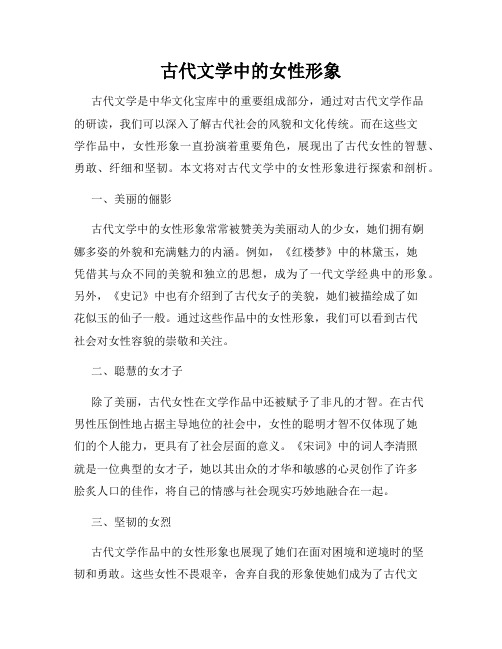
古代文学中的女性形象古代文学是中华文化宝库中的重要组成部分,通过对古代文学作品的研读,我们可以深入了解古代社会的风貌和文化传统。
而在这些文学作品中,女性形象一直扮演着重要角色,展现出了古代女性的智慧、勇敢、纤细和坚韧。
本文将对古代文学中的女性形象进行探索和剖析。
一、美丽的俪影古代文学中的女性形象常常被赞美为美丽动人的少女,她们拥有婀娜多姿的外貌和充满魅力的内涵。
例如,《红楼梦》中的林黛玉,她凭借其与众不同的美貌和独立的思想,成为了一代文学经典中的形象。
另外,《史记》中也有介绍到了古代女子的美貌,她们被描绘成了如花似玉的仙子一般。
通过这些作品中的女性形象,我们可以看到古代社会对女性容貌的崇敬和关注。
二、聪慧的女才子除了美丽,古代女性在文学作品中还被赋予了非凡的才智。
在古代男性压倒性地占据主导地位的社会中,女性的聪明才智不仅体现了她们的个人能力,更具有了社会层面的意义。
《宋词》中的词人李清照就是一位典型的女才子,她以其出众的才华和敏感的心灵创作了许多脍炙人口的佳作,将自己的情感与社会现实巧妙地融合在一起。
三、坚韧的女烈古代文学作品中的女性形象也展现了她们在面对困境和逆境时的坚韧和勇敢。
这些女性不畏艰辛,舍弃自我的形象使她们成为了古代文学作品中最崇高的形象之一。
《西廂记》中的杜丽娘,她为了与心上人相见,舍弃了一切,最终以自杀的方式表达了自己对爱情的忠诚。
这种坚韧和勇敢的精神在古代女性形象中是普遍存在的。
四、温柔的女性情感在古代文学作品中,女性形象承载着丰富的情感,她们展现了宠爱、温柔、体贴和无私的特质。
《红楼梦》中的林黛玉和贾宝玉之间的相爱,展现了古代女性在情感方面的丰富表达和细腻描绘。
在《红楼梦》中的描写中,我们可以看到古代女性形象通过情感的展示牵动了读者的心弦,也反映出古代女性真挚而深厚的情感世界。
总结:古代文学作品中的女性形象丰富多样,通过对她们的研究和剖析,我们可以看到古代社会对女性的关注和肯定。
文学名著中的女性形象

• 以林语堂《京华烟云》中的姚木 兰为例,她既具有东方女性的柔美, 又具有西方女性的独立和智慧 • 哈姆雷特》中的奥菲利亚,她既 是丹麦的公主,又具有印度的神秘 色彩,展现了跨文化的女性形象
02
女性形象的塑造与变迁
历史变迁对女性形象的影响
封建社会的女性束缚
• 封建礼教对女性的束缚,使她们沦为男性的附庸,无法追求自己的幸福 • 女性地位的低下,使她们在文学作品中成为被描绘的对象,而非主体
近现代社会的女性解放
• 辛亥革命和五四运动推动了女性的解放,使她们在文学作品中成为独立的主体 • 女性开始追求自己的事业和爱情,展现了女性的独立和自强
当代社会的女性平等
• 女性在社会的各个领域取得了平等的地位,使她们在文学作品中展现出多样的形象 • 女性既可以成为家庭的守护者,也可以成为社会的建设者,展现了女性的多样性和力量
不同时期文学作品中的女性形象对比
古典文学作品中的传统女性
• 女性形象以贞矣、婉矣、贤良为主,她们是男性的附庸,缺乏独立的人格 • 女性形象被固定在家庭和道德伦理的框架内,无法追求自己的幸福
现代文学作品中的新女性
• 女性形象以独立、自主为主,她们勇敢地走出家庭,追求自己的事业和爱情 • 女性形象在文学作品中成为独立的主体,展现了女性的多样性和力量
谢谢观看
THANK YOU FOR WATCHING
女性自身的局限
• 女性在历史上长期处于被动地位,使 她们在文学作品中缺乏主动性和创造性 • 女性形象的塑造受到女性自身局限的 影响,如生理、心理等方面的因素
女性形象的突破与重塑
女性解放运动的推动
• 辛亥革命和五四运动推动了女性的解放,使她们在文学作品中成为独立的主体 • 女性开始追求自己的事业和爱情,展现了女性的独立和自强
女性形象

个人形象设计
艺
社交活动 形象
视觉形象
形象礼仪
礼仪是指在人际交往中,以一定的方式来 表现的律己、敬人的完整行为。 在人际交往中,为表示自尊和尊重他人而 对个人的形象进行修饰、塑造和设计的行 为即形象礼仪。
形象在现代社会的重要性
形象力做为人力资源的第三大资源,与人的体力和智力资源并举,构 成这个时代人力资源的最新结构,也标注了重新认识人力资源的开始。
目光 微笑
目光运用的技巧
目光凝视区域: A、公务凝视区域:以两眼为底线、额中为顶角形成的三角 区。 B、社交凝视区域:以两眼为上线、唇心为下顶角所形成的 倒三角区。 C、亲密凝视区域:从双眼到胸部之间。 目光运用中的忌讳: 盯视、眯视、斜视、瞟视。
目光接触的技巧
视线向下表现 权威感和优越感 视线水平表现 客观和理智 视线向上表现 服从与谦恭
人 生 质 量
100 80 60 40 20 0 人生战略问题
健康管理
知识管理
形象管理
情感管理
职业生涯管理
优质的形象管理会提升人生的综合质量
二、如何塑造良好的形象
总体要求: 保持整洁;注重服饰、发型、 化妆三大设计;调整表情;注意 言谈举止仪态;培养优雅礼仪
(一)整洁——最好的修饰
头发:无头屑,不染过于个性的发色,不做奇异发型。不用华丽头 饰。
(二)着装原则与禁忌
TPO原则:符合时间、地点、场合气氛的原则。
盛装原则:一种最安全的着装方法。
统一原则:服装类型要统一。
适度原则:
不能过分张扬和夸张。
扬长避短原则。着装要考虑体型、肤色、气质、年龄等。
职业装基本款式要求
1、有领 2、有袖 3、前门开襟 4、有扣子 5、搭配西装短裙
- 1、下载文档前请自行甄别文档内容的完整性,平台不提供额外的编辑、内容补充、找答案等附加服务。
- 2、"仅部分预览"的文档,不可在线预览部分如存在完整性等问题,可反馈申请退款(可完整预览的文档不适用该条件!)。
- 3、如文档侵犯您的权益,请联系客服反馈,我们会尽快为您处理(人工客服工作时间:9:00-18:30)。
PortiaQuick-witted, wealthy, and beautiful, Portia embodies the virtues that are typical of Shakespeare’s heroines—it is no surprise that she emerges as the antidote to Shylock’s malice. At the beginning of the play, however, we do not see Portia’s potent ial for initiative and resourcefulness, as she is a near prisoner, feeling herself absolutely bound to follow her father’s dying wishes. This opening appearance, however, proves to be a revealing introduction to Portia, who emerges as that rarest of combinations—a free spirit who abides rigidly by rules. Rather than ignoring the stipulations of her father’s will, she watches a stream of suitors pass her by, happy to see these particular suitors go, but sad that she has no choice in the matter. When Bassanio arrives, however, Portia proves herself to be highly resourceful, begging the man she loves to stay a while before picking a chest, and finding loopholes in the will’s provision that we never thought possible. Also, in her defeat of Shylock Portia prevails by applying a more rigid standard than Shylock himself, agreeing that his contract very much entitles him to his pound of flesh, but adding that it does not allow for any loss of blood. Anybody can break the rules, but Portia’s effectiveness comes from her ability to make the law work for her.Portia rejects the stuffiness that rigid adherence to the law might otherwise suggest. In her courtroom appearance, she vigorously applies the law, but still flouts convention by appearing disguised as a man. After depriving Bassanio of his ring, she stops the prank before it goes to far, but still takes it far enough to berate Bassanio and Graziano for their callousness, and she even insinuates that she has been unfaithful.第一时期(1590~1600年)以写作历史剧、喜剧为主,有9部历史剧、10部喜剧和2部悲剧。
9部历史剧中除《约翰王》是写13 世纪初英国历史外,其他8部是内容相衔接的两个4部曲:《亨利六世》上、中、下篇与《查理三世》;《查理二世》、《亨利四世》(被称为最成功的历史剧)上、下篇与《亨利五世》。
这些历史剧概括了英国历史上百余年间的动乱,塑造了一系列正、反面君主形象,反映了莎士比亚反对封建割据,拥护中央集权,谴责暴君暴政,要求开明君主进行自上而下改革,建立和谐社会关系的人文主义政治与道德理想。
10部喜剧《错误的喜剧》、《驯悍记》、《维洛那二绅士》、《爱的徒劳》、《仲夏夜之梦》、《威尼斯商人》、《温莎的风流娘儿们》、《无事生非》、《皆大欢喜》和《第十二夜》大都以爱情、友谊、婚姻为主题,主人公多是一些具有人文主义智慧与美德的青年男女,通过他们争取自由、幸福的斗争,歌颂进步、美好的新人新风,同时也温和地揭露和嘲讽旧事物的衰朽和丑恶,如禁欲主义的虚矫、清教徒的伪善和高利贷者的贪鄙等。
莎士比亚这一时期戏剧创作的基本情调是乐观、明朗的,充满着以人文主义理想解决社会矛盾的信心,以致写在这一时期的悲剧《罗密欧与朱丽叶》中,也洋溢着喜剧气氛。
尽管主人公殉情而死,但爱的理想战胜死亡,换来了封建世仇的和解。
然而,这一时期较后的成熟喜剧《威尼斯商人》中,又带有忧郁色彩和悲剧因素,在鼓吹仁爱、友谊和真诚爱情的同时,反映了基督教社会中弱肉强食的阶级压迫、种族歧视问题,说明作者已逐渐意识到理想与现实之间存在着难以解决的矛盾。
When William Shakespeare wrote, The Merchant of Venice, he included a female character that influences the play dramatically. In most of Shakespeare's plays, the women have little power and intelligence. In The Merchant of Venice, however, Portia is a woman that saves the life of a man with her wit and intelligence. Another woman created by Shakespeare that posses qualities similar to Portia is Beatrice, from Much Ado about Nothing. Both women add to the main themes of the play because of their ability to use their intelligence and witty remarks as well as having a loving heart. The women share many similarities as well as many differences which seem to be inevitable because Portia seems to be put on a pedestal that very few can reach.Portia is one of Shakespeare's great heroines, whose beauty, lively intelligence, quick wit, and high moral seriousness have blossomed in a society of wealth and freedom. She is known throughout the world for her beauty and virtue, and she is able to handle any situation with her sharp wit. In many of Shakespeare's plays, he creates female characters that are presented to be clearly inferior to men.The one female, Shakespearean character that is most like Portia would be Beatrice, from Much Ado about Nothing. Both of the women are known for their wit and intelligence. Beatrice is able to defend her views in any situation, as does Portia. Shakespeare gives each of them a sense of power by giving their minds the ability to change words around, use multiple meanings and answer wisely to the men surrounding them. By adding a loving heart to both of these women, Shakespeare makes their intelligence more appealing. Even though Beatrice hides the loving side of her character for most of the play, she still expresses her kindness and love in other ways. Like Portia, she is a dear friend and an obedient daughter. In the fourth act, after Portia has saved the life of Antonio, she uses her wit, just as Beatrice does to test Benedict's love, to convince Bassanio to surrender the ring that he vowed he would never part with. After simply asking for it and being unsuccessful, she decides to use her intelligence and says, I see sir, you are liberal in offers. / You taught me first to beg, and now methinks / You teach me how a beggar should be answer'd (IV.ii.438-440). The only main difference between the two women is the way they are perceived by the other characters. Portia is thought of as a perfect angel possessing no flaws, which is shown when Bassanio describes her to Antonio and says, In Belmont is a lady richly left, / And she is fair and, fairer than that word, / Of wondrous virtues?Nor is the wide world ignorant of her worth, / Forthe four winds blow in from every coast / Renowned suitors, and her sunny locks / Hang on her temples like a golden fleece, / Which makes her seat of Belmont Colchis' strond, / And many Jasons come in quest of her (I.i.161-172). Portia displays all the graces of the perfect Renaissance lady. She is not ambitious, she is quiet rather than restrictive. She is modest in her self-estimation. Her generous spirit makes her wish she had more virtue, wealth, and friends so that she can better help those she loves. Beatrice, on the other hand, is not described as beautiful and even though she is well liked in her society, she is not thought of in the same godly way as Portia is. Besides saving the life of Antonio, Portia is also used to convey the theme of deceptive appearances. Throughout the play, Shakespeare uses his characters to show the audience that a person cannot be judged by how they appear to the eye and that a person can truly be identified by their inner soul. Bassanio chooses the lead casket and proves that even though the other caskets appeared to be beautiful and trustworthy, the treasure was found in the casket of lead. Shakespeare foreshadows the theme of appearances when Portia says to her new husband, You see me, Lord Bassanio, where I stand, / Such as I am?But the full sum of me / Is an unlesson'd girl, unschool'd, unpractic'd, / Happy in this, she is not yet so old / But she may learn; happier than this, / She is not bred so dull but she can learn (III.ii.149-164). After saying this to her husband, she later dresses up as a man and finds a way to release Antonio from his bond with Shylock, when no one else is able to. She proves to the audience and to her friends that even though she might have been perceived as an unlesson'd, unschool'd, unpractic'd girl, her inner self, posses the strength, intelligence and experience that enables her to do what she did. When Shakespeare created Portia's character, he contributed the likeness of Beatrice and added the elements of a perfect Renaissance woman. Even though Portia is a woman, she still posses the intelligence to use and manipulate words, the beauty to woo men, and the soul that stands above many others. Her appearance adds to her angelic reputation and her wisdom allows the audience of the play to acknowledge the theme of deceptive appearances.。
